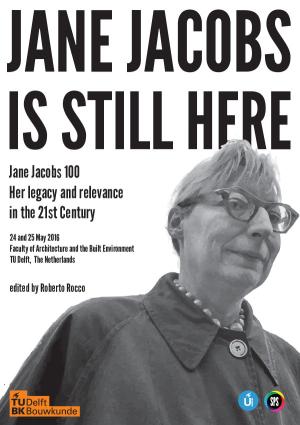Hosted by
Jane Jacobs is still here: Jane Jacobs 100 Her legacy and relevance in the 21st Century
Synopsis
On the occasion of Jane Jacobs’ 100 anniversary, the chair of Spatial Planning and Strategy of the Delft University of Technology, together with the OTB Research Institute for the Built Environment and the Rotterdam Erasmus University College organised a two-day conference on Jane Jacob’s legacy at TU Delft on 24-25 May 2016. This event was complemented one year later by a ‘Jane Jacobs Year’ closing event.
We wished to celebrate the life and accomplishments of one of the most important urban thinkers of our time, someone who has influenced generations of designers and planners and others concerned with the built environment: the great Jane Jacobs.
Jacobs’ theories and ideas are seminal to many different academic fields: urban design, planning, architecture, sociology, human geography, environmental psychology, economic geography and many more. Her writings have been influential for more than five decades. This alone tells us of her importance for urban studies and for understanding the complex relationship between urban space and society.
This is reflected, among other things, in the immense popularity of Jane’s ideas among young planners and designers. A simple Google search of the term “urban planner” yields the following results: A line-up of male planners is headed by a woman, the most relevant of them all (at least according to Google’s algorithms), Jane Jacobs! This is ironic since Jane Jacobs would hardly see herself as a planner.
Maybe, like Roberta Gratz (who was a friend of Jacobs’), she was an ‘anti-planner’, someone with a keen eye for careful empirical observation, for whom cities ought to be understood from the careful exploration of how the built environment influences and is influenced by human life. Jacobs was an astute observer of the life of cities and the processes that produce both cities and citizenship.
In their contributions, the authors of the texts included in this book demonstrate how Jacobs is still relevant as a theorist in the realms of politics, economics and design, and how she can also help us understand how urban form yields meaning. But they also criticise and review her ideas in light of the experiences accumulated in more than 50 years since her main works were published, and the perspectives of places that have little similarity to New York or Toronto. This is relevant because indeed Jane Jacobs’ ideas are being reviewed reinterpreted and reinvented, and occasionally refuted, in contexts as diverse as Cairo, São Paulo or Addis Ababa. And it’s high time this happens.
The conference aimed to explore those new insights on Jacobs’ legacy and to take her ideas forward in the context of globalisation, internationalisation and accelerated urbanisation in places like China, India and Brazil. The intensity and scale of current urbanization are unprecedented and new challenges have emerged since she published her texts. How are the ideas of Jane Jacobs still relevant for the understanding of the interplay between urban space and society? Or do we need new theories? To what extent have Jacobs’ ideas inspired today’s urban leaders and thinkers? How are they tackling urban issues such as growing inequality, spatial fragmentation, street life, safety in the public space and environmental decline?
We discussed Jacobs’ ideas critically and to take stock of how those ideas have been used, misused and hopefully updated. We invited abstract submissions for six different tracks, exploring essential aspects of Jacobs’ ideas:
- Track 1: Jane Jacobs, ethics, and the just city
- Track 2: Jane Jacobs and Street Spaces — Streets as public places
- Track 3: Jane Jacobs and the dynamics of neighbourhoods
- Track 4: Jane Jacobs and the Reshaping old urban fabrics in Chinese cities
- Track 5: Jane Jacobs and organised complexity Track 6: Jane Jacobs and safety in public space
The conference was organised by Roberto Rocco (TU Delft Urbanism), Brian Doucet (University of Waterloo, Canada, then Erasmus University College in Rotterdam) and Andre Ouwehand (TU Delft OTB).

